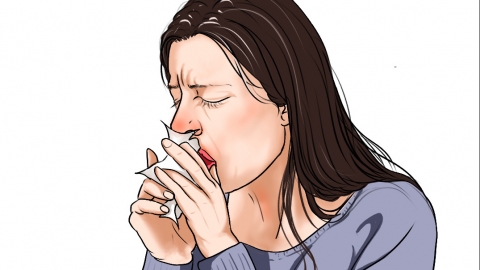What are the reasons for a persistent cough and how to treat it?
Persistent coughing may be caused by environmental irritants, unhealthy lifestyle habits, chronic bronchitis, cough variant asthma, or gastroesophageal reflux disease. It can be improved through daily lifestyle adjustments and medication. It is recommended to seek timely medical attention and follow the guidance of a physician for treatment.

1. Environmental irritants: Prolonged exposure to air pollution, smoky environments, cold dry air, or areas with high pollen concentrations can continuously irritate the respiratory mucosa, causing persistent coughing, often dry cough. Symptoms may improve after leaving the irritating environment. Wear a mask when going outdoors, ensure indoor air circulation, use a humidifier to regulate humidity, and avoid irritating environments as much as possible.
2. Unhealthy lifestyle habits: Excessive smoking and alcohol consumption or regularly consuming spicy or irritating foods can damage the throat and respiratory mucosa, leading to prolonged coughing. Symptoms may include a foreign body sensation in the throat and dry mouth. Quit smoking, limit alcohol consumption, adjust dietary habits, reduce intake of spicy foods, drink plenty of water, and consume more mild, lung-nourishing foods.
3. Chronic bronchitis: Chronic nonspecific inflammation of the bronchial mucosa and surrounding tissues caused by long-term smoking, recurrent infections, etc., characterized by long-term recurring cough and phlegm production, with symptoms worsening in the morning or during temperature changes. Patients may use medications such as amoxicillin capsules, ambroxol hydrochloride oral solution, and salbutamol aerosol under a doctor's guidance to alleviate symptoms.
4. Cough variant asthma: A special type of asthma characterized mainly or solely by chronic cough. Due to airway hyperresponsiveness, paroxysmal irritating dry cough may occur after exposure to cold air, dust, or other irritants, with symptoms particularly noticeable at night or in the early morning. It is recommended to use medications such as budesonide and formoterol fumarate inhalation powder, montelukast sodium tablets, or terbutaline sulfate nebulizing solution under medical guidance to relieve discomfort.
5. Gastroesophageal reflux disease (GERD): Caused by dysfunction of the lower esophageal sphincter, stomach acid and gastric contents reflux into the esophagus, irritating the throat and causing coughing, often worsening after meals or when lying flat, accompanied by symptoms such as heartburn and acid regurgitation. Follow medical advice to use medications such as omeprazole enteric-coated capsules, domperidone tablets, or hydrotalcite chewable tablets to improve symptoms.
In daily life, it is recommended to maintain healthy lifestyle habits, eat a light diet, and ensure adequate water intake. For daily dietary needs, maintain a balanced diet with diverse food sources to help sustain overall health.







